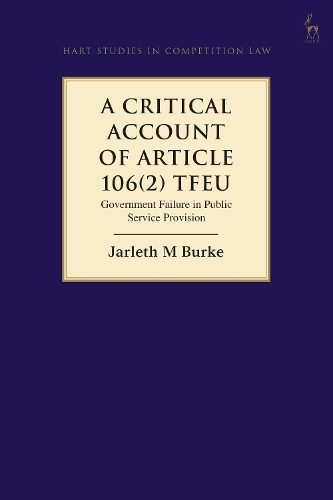
A Critical Account of Article 106(2) TFEU: Government Failure in Public Service Provision
(Hardback)
Publishing Details
A Critical Account of Article 106(2) TFEU: Government Failure in Public Service Provision
By (Author) Jarleth Burke
Bloomsbury Publishing PLC
Hart Publishing
22nd March 2018
United Kingdom
Classifications
Professional and Scholarly
Non Fiction
343.2408
Physical Properties
Hardback
256
Width 160mm, Height 236mm, Spine 20mm
540g
Description
A Critical Account of Article 106(2) TFEU: Government Failure in Public Service Provision offers a sceptical perspective on how EU law applies to public services. Article 106(2) provides that other Treaty rules may be disapplied in order to sustain a Service of General Economic Interest (SGEI). The rhetorical presentation of Article 106(2) is as a strict exception. As a result, Article 106(2) is often presented as a threat to Europes public service tradition. This book challenges those shibboleths by using the concept of government failure. It is concerned with instances of government intervention that are unnecessary, generate avoidable inefficiencies, or that can be bettered so as to realise general interest goals more efficaciously. As an element of the government failure critique, a market feasibility test incorporating the concept of market failure is used to expose laxity in the review of general interests under Article 106(2). Complementing that, the process of disapplying other Treaty rules under Article 106(2) is shown to have evolved from being strict to being highly indulgent of SGEI providers, with a relatively recent but only partial correction post Altmark. Overall, the strict exception label for Article 106(2) does not hold. Moreover, it is contingent and presents no legitimate general interest related threat to the organisation and delivery of public services. A comprehensive re-orientation of Article 106(2) on issues of proof is required, as is greater reliance on market counterfactuals, and much more careful separation of objectives and means in SGEI operation and design. Through these measures, the toleration of government failure can be stemmed and Article 106(2)s contingency reduced.
Reviews
Making sense of art.106(2) TFEU and the case law around it is not an easy task and even less so is providing a critical and well-reasoned proposal for its improved implementation. Hence, the author of this book has surely chosen a challenging task and is to be congratulated for mastering it in great detail and with a commendable measure of sophistication throughout the book. -- Katri Paas-Mohando * European Competition Law Review *
Author Bio
Jarleth Burke is a barrister specialising in competition law and economic regulation and he is a fellow of the Tilburg Law and Economics Centre (TILEC).
